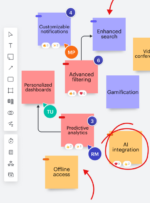
It was around late 2017 when we first reported on ‘value stream management‘ as it pertained to software development. By now, everyone knows that value stream concepts were first introduced on manufacturing floors, and were designed to eliminate waste (of effort and materials) and wait times (dependence on others to complete tasks before you could complete yours).
But as software development organizations started using Agile for faster production and DevOps to accommodate that speed through the use of CI/CD pipelines, microservices and containers, APIs and cloud infrastructure, these organizations found that things weren’t running as smoothly as they should. Gaps appeared with software testing and security. Development teams were stalling as engineers were pulled off one project and onto another, and as priorities for the effort changed. Studies have shown they face challenges with poorly integrated toolchains, misalignment of work between teams and isolated areas of automation.
There was a need to take DevOps to the next level, and in the January 2019 cover story in SD Times, our editors declared that would be ‘The Year of the Value Stream.’ Since then, we’ve seen more solution providers plant a stake in the ground of that industry segment, offering solutions that help development shops find the waste in their processes and gain better efficiency while maintaining high quality of software delivered.
The way software development has evolved, with autonomous teams owning their projects, and managers only seeing what their teams are doing, has made it nearly impossible for enterprises employing numerous developers working on pieces of projects to see the overall effects of what’s working and what isn’t. They’re told of the problems, but can’t assess how that is impacting business goals because they don’t have the big-picture view.
“In the beginning of DevOps, a lot of it was purely looked at as, ‘How fast can I push things out?’ That’s still important, the idea that I can move things, but can I move things that make a difference?” Thomas Murphy, Gartner research director, told me in a recent conversation. “As a developer, I want to build things that matter … to the customer, whether internal or external. If it’s internal, it could be operational efficiency. If it’s external, it could be customer satisfaction, it could be an increase in shopping cart conversation rates. I’m building features that people love, and drive them to consume the things we build. You’re not just building stuff to build stuff.” Value streams, he added, create a better conversation between engineers and the business.
Last month, D2Emerge — publishers of SD Times and ITOps Times — announced {Virtual} VSM DevCon, a one-day training event on value stream creation, management and optimization specifically targeting development teams.
Based on some Lean manufacturing principles, value stream management for software teams prevents some different challenges. For one, if I’m manufacturing, say, a car, specs for doing so are slow to change. Even as the big auto companies introduce new models, much of the construction doesn’t change, or only require slight modifications.
Software production, though, changes often — and rapidly, making it even more important to continuously assess production processes to make sure the efficiencies gained by implementing a value stream for development are maintained from project to project — er, from product to product.
Value stream, Gartner’s Murphy said, is an extension of the development toolchain. “Traditionally, the tool chain has been an assembly of things… All those parts are moving independently. There’s a new version of Jenkins, and that screws up my toolchain. You need to buy solutions that pull it all together. The value stream thing isn’t just the code-to-cloud pipeline; it’s what’s the backlog, and it’s release orchestration and monitoring. It’s this broader scope, the whole DevOps view.”
The development team will continue to own their practices, what’s working and what’s new, and what should they be adding, Murphy said. This is why there’s the continued importance of communities of practice, like DevOps dojos. Organizations need these practitioners to share new ideas so they can continue to evolve.
That includes value steam practitioners. {Virtual} VSM DevCon will look at such topics as:
- How do you define value in software development
- Software testing in the value stream
- Architecting for value stream
- Creating a value stream culture with new and changed roles
- What does DevOps have to do with value stream?
- And more
You can learn more about {Virtual} VSM DevCon and register to attend on the event website, https://events.sdtimes.com/valuestreamdevcon. Did I mention it is free to attend?
Hope to see you there!






